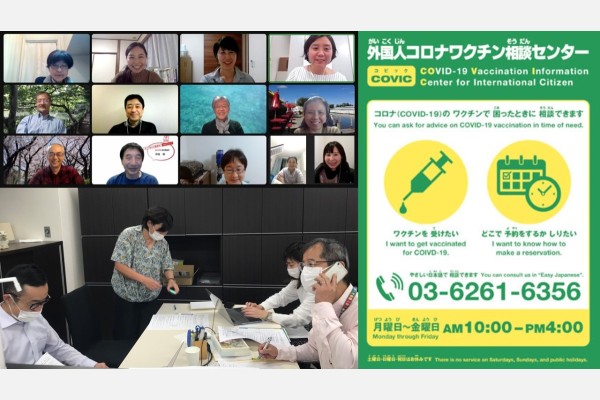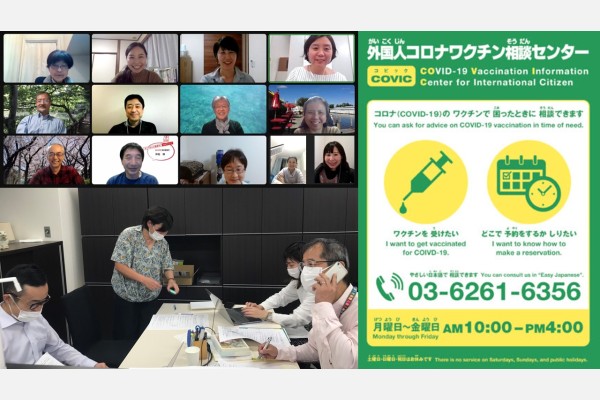Repository of Practices

COVID-19 Vaccination Information Center for International Citizen (COVIC), a call center to support migrants in Japan to receive COVID-19 vaccines
Secondary GCM Objectives
Dates
Type of practice
Summary
Studies from several countries suggest that COVID-19 vaccination rates are lower among migrants compared to the general population. This is also the case in Japan and several factors may be contributing to making it difficult for migrants to receive COVID-19 vaccines. These include language and social barriers, socioeconomic status, and the complexity of procedures before vaccination. While each municipality sends a vaccination voucher to all eligible people on the Basic Resident Register, those who are not on the registry need to request a municipality office to issue a voucher, which is often a tough hurdle for those with unstable residency status. Particularly, undocumented migrants face a series of challenges such as demonstration of identification and proof of residence and being reported to immigration authorities by municipality officers. Whereas some municipalities prioritized public health, accommodating the specific needs of migrants who are not on the registry, others were less responsive.
To support these migrants in accessing COVID-19 vaccines, the COVID-19 Vaccination Information Center for International Citizen (COVIC) was established in September 2021 by Citizen's Network for Global Activities (CINGA), in collaboration with Migrants' Neighbor Network & Action (MINNA) which is comprised of the Bureau of International Health Cooperation of the National Center for Global Health and Medicine (NCGM), Services for Health in Asian African Regions (SHARE), Our SDGs Task Force for Foreigners, and the Institute of Developing Economies (IDE-JETRO).
COVIC receives phone calls from migrants and provides support in multiple languages in cooperation and coordination with the nationwide network of International Exchange Associations and NGOs. During the 6 months, COVIC assisted over 400 people from over 20 countries living in 20 prefectures. There were a wide variety of reasons for phone calls. Examples include how to get vaccinated for an undocumented migrant, what to do when the caller threw away the envelope with the vaccination voucher, what to do when the caller was undocumented and in hiding for 20 years but now would like to be vaccinated due to old age, and other vaccine-specific questions. The COVIC not only assessed client needs, provided information, and referred clients to a specific service, but also served as a caseworker by contacting relevant stakeholders such as municipality offices, International Exchange Associations and NGOs to find a solution, together with or on behalf of the client. COVIC had technical supporters who have expertise in health, the municipality support system for migrants, and immigration law and administrative procedures. COVIC provided individualized support that the government or municipalities could not provide and accompanied many clients throughout the process until their vaccination is assured.
Organizations
Main Implementing Organization(s)
Detailed Information
Partner/Donor Organizations
Benefit and Impact
As stated in the summary, COVIC supported those with unstable residency status in Japan to receive COVIC-19 vaccines. One of the greatest fears for undocumented migrants to be vaccinated was being deported or detained and COVIC reassured the callers and made municipalities aware of the announcement by the Ministry of Health, Labour, and Welfare stating that they can choose not to report in this public health emergency. COVIC talked to municipalities and enabled 152 migrants to receive vaccination vouchers necessary to be vaccinated. This includes 18 cases that required several calls per case.
2. Increased awareness of municipalities in vaccinating migrants
Given the small percentage of migrants in Japan, many municipalities were not used to assisting migrants and failed to issue vaccination vouchers for foreigners not listed on the Basic Resident Register although announcements from the Ministry of Health, Labour and Welfare (MHLW) did not exclude them. For example, those with residency status of three months or less and those under provisional release were not initially able to obtain vaccination vouchers mainly because of municipalities’ insufficient understanding of MHLW’s announcements. Almost all finally received vouchers after COVIC intervened.
3. Improved collaboration between health departments and international affairs departments/associations at the local level as the foundation for better health care for migrants COVIC encouraged municipalities to provide information in multiple languages and improved healthcare access for migrants. It strengthened the linkage between the international exchange association and the health sectors. Additionally, COVIC shared its findings through multiple channels including a web conference of MHLW to exchange experiences to improve healthcare access among migrants.
Key Lessons
In Japan, the authority to issue the vaccine voucher has been decentralized to the municipality level. As stated above, some municipalities prioritized public health, accommodating the needs of migrants who are not on the Basic Resident Register, but others were less responsive. CINGA, the organizer of COVIC had extensive experience and knowledge to address socio-economic, cultural, linguistic and legal issues faced by migrants. COVIC supported and advised the municipalities in accommodating the needs of migrants, making them more migrant-friendly.
2. Reaching the unreached: creating effective ways to deliver and disseminate information to migrants in need
One of the challenges in assisting the vulnerable population is the scarcity of effective ways to deliver information to them. There were different methods COVIC used to reach the migrants and deliver information about the work of COVIC. To reach the Vietnamese community, which is the second-largest foreign community in Japan accounting for 15.9% of the immigrants according to the Immigration Services Agency of Japan, COVIC had a group of Vietnamese individuals (“V(Vietnam) -team”) that included Vietnamese interpreters and medical students that filled in the cultural gaps and fostered a smooth communication. Additionally, there were other community key persons that COVIC reached such as doctors working in Japan from the same ethnicity that had influence to their community and the Embassy of each country. We believe that understanding the culture and having multi-channels to deliver information were the keys to reaching the migrants in need.
3. Seminars to overcome geographical barriers
COVIC is located in Tokyo and it was challenging to let ourselves known across the country. COVIC hosted multiple seminars to explain the purpose and the work of COVIC to the members of the International Exchange Associations which work with the municipalities to assist migrants including providing interpreter services and other non-governmental organizations. Hence, COVIC became the hub for connecting and collaborating with multiple cultural mediators across the country.
Recommendations(if the practice is to be replicated)
For other countries implementing a similar activity, we recommend the following based on our experiences (i) navigating the municipalities with a depth of knowledge of the system and situations of the migrants (ii) having different and effective methods to deliver information about the call center program to the migrants and (iii) establishing a platform across multiple sectors and in different geographic areas.
Innovation
Additional Resources
Additional Images
Date submitted:
Disclaimer: The content of this practice reflects the views of the implementers and does not necessarily reflect the views of the United Nations, the United Nations Network on Migration, and its members.
More Related Practices:
- Tablero Interactivo Estadísticas sobre Movilidad y Migración Internacional en México
- Encuesta Nacional Migrante de la Argentina (ENMA)
- Cultural advisories in the services of maternity´s health for the indigenous cross-border community Ngäbe Bugle (WHP)
- A Journey of a Thousand Mile Begins with a single Step: Djibouti’s Experience in Strengthening Migration and Displacement Data Governance
- A designated migration module for processing comprehensive migration data in the existing Information Monitoring and Evaluation system of TB patients in the Republic of Moldova (SIME TB)
Peer Reviewer Feedback:
*References to Kosovo shall be understood to be in the context of United Nations Security Council resolution 1244 (1999).
Newsletter
Subscribe to our newsletter.
